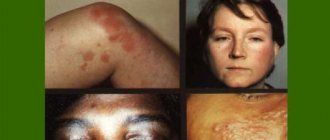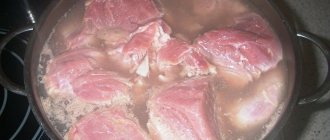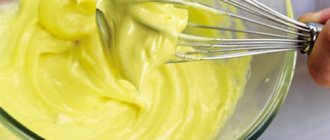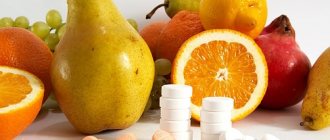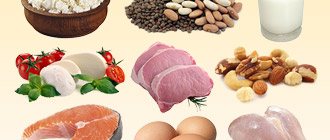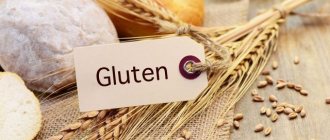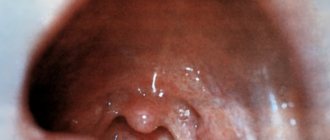What and how can you eat when you have a cold?
It is important not only to include in the menu foods that help during the flu, you also need to adhere to a certain gastronomic order. You should develop a specific diet, divided into 5 meals. It is better to eat in small portions, but several times, than to eat a large amount of food at one time
. These techniques should be performed at a strictly defined time, this is especially important for children.
It is better to give preference to boiled or baked foods rather than fried foods. The presence of a crust, a large amount of fat or vegetable oil is not an option for someone with a cold. If you want fruit when you have a cold, you don’t need to limit yourself. On the contrary, fruits and berries rich in vitamins will benefit a weakened body. Please note that fruits should be consumed fresh. Combining them with sugar, syrup or jam will negatively affect white blood cells, which play a protective role in the body, actively fighting viruses.
The diet of the child and adult during this period should be enriched with vitamins. To do this, you need to eat as much fresh vegetables, berries and fruits as possible. Vitamin C is found in lemon, black currants, apples, oranges, tangerines, sauerkraut and sweet peppers.
The vitamin is found in rosehip infusion and decoction. Vitamin A, which is important for a sick body, can be found in eggs, liver, butter and hard cheese. Vitamin B2, also called riboflavin, is found in almonds, cheese, chicken eggs, yeast and cottage cheese. B6, or pyridoxine, is found in sufficient quantities in offal, beans, soybeans, yeast, potatoes, rice, millet and buckwheat. To improve immunity, you need to provide your body with vitamin D, which can be obtained by eating salmon, herring, mackerel, tuna, eggs, sour cream and cream.
Should you include fish and vegetables in your diet?
When dealing with the flu in adults, you need to act rationally: be sure to eat carrots, beets, and herbs (parsley, onions, dill). For meat products, lean pieces of chicken and veal are best. Do not neglect fish products; it is better to give preference to squid and shrimp. You should definitely include in your diet porridges cooked with milk, rice, millet or oatmeal. You should drink as much milk as possible and eat fermented milk products: cottage cheese, sour cream, yogurt, kefir. It is important to eat nuts during this period; eating a small handful per day is enough.
Consumption of all these foods in reasonable quantities is the basis of proper nutrition. It will have a positive effect not only on a sick body, but also on a healthy one. This rule is especially true for women. A representative of the fair sex who eats according to these principles will be able to get into shape quite quickly and without harm to her health, without following strict diets.
One of the useful foods at this time is garlic. It actively fights various viruses and microorganisms. The best option is to use it in its pure form. Only the most desperate people can eat garlic this way; for the picky people there are alternative options for consumption. Garlic cloves can be eaten with some dish, preferably soup. It can be grated on a fine grater, mixed with sour cream and butter and seasoned with the mixture on a salad or spread on bread.
Garlic can also be eaten after the flu for preventive purposes.
Onions and hot peppers have a slightly lesser effect. These foods are worth eating to prevent colds. It is important to drink plenty of fluids when you have a cold. This can be boiled water, all kinds of teas and infusions. An effective remedy against colds is tea with spices. An excellent option would be to consume various unsweetened berry fruit drinks, mint infusions and herbal teas. It is better to exclude alcoholic drinks, fruit juices, strong tea and coffee from the diet during illness.
What should you not eat when you have a cold?
Proper nutrition consists not only of eating quality foods, but also of eliminating harmful ones that have a negative effect on the body. What foods should you not eat during colds and flu? There are several of them:
You should not consume these products for several weeks after the flu. This is due to the fact that the body, weakened after illness, will not be able to adequately respond to the appearance of harmful food, even if previously it was often present on the patient’s menu.
By following a special diet during a cold, you can recover much faster. You should always be aware of what you eat. Any harmful product will negatively affect the functioning of the body.
For a speedy recovery from respiratory diseases, it is necessary to take not only drug treatment, but also quite familiar actions. Nutrition during influenza is of particular importance; the diet should be rich in components that are useful and valuable for the body.
A dangerous infectious disease requires a serious approach to treatment and prevention. Of course, drug therapy is of great importance. But you need to know what symptoms and consequences the infection causes in order to understand what methods to influence the nature of the disease.
In order for the body to cope with the disease faster, it is necessary to eat properly.
We are surrounded by armies of pathogenic bacteria and viruses, and under certain factors they begin to multiply rapidly. These factors are:
- air temperature from -5 to 5 degrees;
- human hypothermia;
- walking for a long time in wet shoes;
- chronic diseases.
The body becomes vulnerable with reduced immunity, which is influenced by the above and other factors. The virus is transmitted by airborne droplets, coughing, and sneezing. Invading the epithelium of the cell, the infection penetrates the blood and spreads throughout the body. At the same time, parts of healthy and pathogenic cells disintegrate, poisoning the entire body, including internal organs. Serious complications arise:
- inflammatory processes in the lungs, bronchi, trachea;
- sinusitis, sinusitis, frontal sinusitis, otitis;
- meningitis, encephalitis;
- disruption of the liver, kidneys, gastrointestinal tract, genitourinary, nervous and vascular systems.
Treatment with medications alone does not fully guarantee a speedy recovery. It is necessary to take a set of measures, which include quite accessible home methods, such as proper nutrition during the flu, bed rest, ventilation and humidification of the room.
It is a mistake to believe that only naturopaths advocate healthy food; leading scientists agree with this, claiming that food directly affects the condition of the infected person.
Nutrition for influenza and ARVI
Let's start with liquid food. Many people ask the question: how much water to drink when you have the flu? We already know that pathogenic viruses and microbes settle on the mucous membrane, and when they enter the bloodstream, they cause severe poisoning of the body. It is to eliminate these risk factors that you need to drink plenty of fluids and eat liquid food. Water and its derivatives - compotes, jelly, fruit drinks - are the main tool for cleaning. At the same time, water moisturizes dry mucous membranes, blocks the growth and impact of pathogenic cells on the body through optimal humidity.
How much fluid to drink when you have the flu
In a healthy state, an adult needs to consume at least 2 liters of water per day
. When infected, the body becomes dehydrated faster and drinking should be increased.
Raspberry tea is very useful for flu
The following drinks have an excellent effect:
- tea with honey - 1 teaspoon per glass of water.
- with raspberries - 1 tablespoon per glass of warm drink.
- Rose hip decoction is the main source of vitamin C. This plant, according to scientists, is a champion in the content of ascorbic acid, which strengthens the human immune system and promotes the regeneration of healthy cells.
Do not forget about the benefits of milk, cocoa, chamomile, linden, calendula and other herbal teas.
Rules for therapeutic nutrition
When a person is sick, those around him have a constant desire to feed and overfeed him. This is the main mistake on the path to recovery. A special feature of nutrition during ARVI is frequent eating in small portions, 5-7 times a day.
In the first days of the disease, patients are weakened and often refuse to eat. In this case, it is best to start treatment by restoring the water balance.
Dishes should be:
- High-energy and easily digestible.
- High in protein. Lack of protein leads to a decrease in the formation of digestive enzymes and antibodies, as a result of which the antimicrobial activity of blood serum is weakened.
- Not fat. It is recommended to use vegetable oil and butter in small quantities.
- With the right carbohydrates that do not cause fermentation in the intestines.
- Not salty. If you have ARVI, you should reduce your salt intake to 8 grams per day.
- Warm (no more than 40 ◦ C).
- Gentle.
- Fortified.
Without maintaining an adequate drinking regime, it is impossible to fully imagine a diet for colds and flu.
Lack of water leads to dryness of the mucous membranes of the throat and nasal cavity, which is a favorable environment for the proliferation of viruses. Proper fluid intake restores mucous membranes, helping to remove germs.
You need to drink often, in small sips, at least 2 liters per day. The liquid must be warm and not contain dyes or preservatives.
- warm water with honey;
- herbal teas with antiviral activity (based on chamomile, thyme, linden, sage);
- tea with raspberries and currants to reduce fever and provide the body with vitamin C;
- fresh juices and juices without sugar;
- tea or infusion of ginger and honey to strengthen the immune system.
- antiviral tea made from raspberry, ginger, cinnamon and coriander branches.
It is unacceptable to take during ARVI:
- alcohol;
- coffee;
- strong black tea;
- carbonated drinks.
Light broths and soups are more effective against ARVI. Chicken broth is especially useful. It inhibits blood cells responsible for the inflammatory response and the development of nasal congestion and sore throat.
From meat dishes you should choose from:
- chicken;
- turkey;
- rabbit;
- veal.
You need to steam, boil or bake without crust.
Oatmeal, rice, and buckwheat porridge provide the body with easily digestible carbohydrates.
Baked or steamed sea fish for ARVI provides an anti-inflammatory effect.
Fermented milk products improve the composition of the intestinal microflora, which makes it easier for the immune system to fight the disease.
Useful:
- kefir;
- cottage cheese;
- leaven;
- natural yogurt.
For ARVI, jam from black currants, raspberries, apples, and sea buckthorn should be eaten daily, several teaspoons a day. It contains a high concentration of vitamin C, which strengthens vascular walls, suppresses the proliferation of viruses and bacteria, and eliminates inflammation and swelling.
Natural Antimicrobial Spices:
- garlic;
- ground black pepper;
- cardamom;
- horseradish;
- ginger.
Their medicinal properties are superior to many antiviral drugs. They can be used in their pure form, made into teas, or added with honey and taken as a mixture.
Garlic deserves special attention. It should be used not only during the period of illness, but also for prevention. Even in minimal quantities when added to the main dish, it begins to act actively, increasing the protective properties of the body.
ARVI symptoms are minimized if you take 1 teaspoon of honey-garlic mixture 3 times a day for 3 days.
The flu diet includes the consumption of large amounts of vitamins, which are found in vegetables and fruits.
Antiviral, anti-inflammatory and protective effects are provided by vitamin C (ascorbic acid). Main sources:
- currant;
- citruses;
- rose hip;
- sauerkraut;
- apples;
- sea buckthorn;
- parsley;
- green onions.
Vitamin A and beta-carotene are needed to stimulate the immune system. It increases the formation of protective lymphocyte cells.
The storehouse of this vitamin is:
- liver;
- egg yolk;
- butter;
- broccoli;
- dried apricots;
- pumpkin;
- tomatoes;
- carrot;
- asparagus.
Vitamin B2, found in cottage cheese, raw eggs, and vitamin D, found in:
- cut fat;
- red fish;
- herring;
- sour cream.
Vitamin B6 affects protein metabolism processes. It is found in large quantities in:
- meat;
- beans;
- buckwheat;
- offal;
- potatoes.
Vitamin E has an antioxidant effect and increases the supply of oxygen to tissues. They are rich in:
- nuts;
- almond;
- peanut;
- sunflower seeds;
- red fish.
In case of ARVI, the following should be excluded from the diet:
- Sweet confectionery and baked goods. Sugar causes a weakening of the immune system, which slows down the healing process. In addition, its particles settle on the mucous membrane of the throat, which is a favorable environment for the growth of microorganisms and increases the risk of complications.
- Hard foods - crackers, shortbread dough, cucumbers. They can further injure already irritated mucous membranes, worsening the patient’s condition.
- Fatty fried foods.
- I'm eating from fast food.
- Canned food.
For a speedy recovery, you must adhere to the following diet plan:
- 1st breakfast: (oatmeal, buckwheat) milk porridge, tea with lemon and ginger;
- 2nd breakfast: steamed omelette, raspberry tea;
- lunch: chicken broth or vegetable soup made from carrots, onions, celery, potatoes, cauliflower and herbs, rice porridge, steamed chicken cutlet;
- afternoon snack: dried fruits or baked apple with cottage cheese;
- dinner: fish and steamed broccoli, kefir.
Diet for colds and flu is not an independent method of treatment, however, if you follow all the rules and recommendations, recovery will come faster, and the use of medications will be reduced to a minimum.
A person suffering from a cold must remain in bed, adhere to a certain diet and take medications.
You should know what you can eat when you have a cold and flu in order to recover as quickly as possible and return to your normal routine.
Naturopathic doctors advocate the use of non-drug methods in treatment. They argue that nutrition during flu and colds significantly influences the human recovery process.
If you eat the right foods, the disease will go away faster. Otherwise, the body will be forced to return to its optimal state longer.
To support a weakened body, it is necessary to provide it with a sufficient amount of drink. As a rule, pathogenic viruses and bacteria accumulate in the oropharynx and nose.
For example, coffee is not a drink that can be consumed when you have a cold or flu. It is better to replace coffee with decoctions of medicinal herbs.
In a sick person, the mucous membranes are dry and inflamed, so the body's protective barriers cannot function normally. If you increase the degree of humidity of the mucous membranes, they will again begin to retain bacteria and stop their negative effects.
A flu diet always involves increased consumption of vitamin C. You can prepare a drink from clean water with a few slices of any citrus fruit. This drink increases the overall tone of the body and supplies it with vitamin C.
If you have a sore throat, you should drink heated water with lemon juice and honey. This remedy is good for the immune system and also allows you to get rid of viral cells, soothing the throat mucosa.
Honey is an effective remedy for colds and flu if used correctly.
Food for colds and flu
During illness, a person is often accompanied by loss of appetite. There is no need to be afraid of this. The body redistributes its forces to fight viruses, and the additional load in the form of digestion can reduce the level of protective forces. Also, given that the disease is accompanied by painful symptoms in the throat, swallowing hard foods is very difficult. And you shouldn’t do this; an inflamed larynx can easily be injured by solid foods. Therefore, it’s okay if a sick person goes on a diet. The main filter, our liver, suffers from fried, spicy, smoked foods.
This organ is already overloaded due to intoxication and the influence of medications. If you do not take into account useful recommendations on what to eat when you have the flu, the largest gland will not be able to process toxins, and they will lead to dysfunction of the kidneys, genitourinary system, etc. Therefore, you need to know how to eat when you have the flu and ARVI, give preference to liquid broths, juices, pureed porridges, etc.
Nutrition for adults with flu
No matter how modern and advanced doctors fight against rich foods, chicken broth for flu and colds is the best remedy. Grandmother’s method of treating colds has repeatedly proven its effectiveness. As it turned out, the broth contains special components that reduce the number of white blood cells - neutrophils, which cause unpleasant symptoms in the nasopharynx - redness, swelling, pain, etc.
When consuming your favorite dish, you must follow important rules: it should not be hot, eat in small portions.
Mashed potatoes are the second most important dish needed for a sick person. The light and fluffy mass will reduce swelling, warm the throat, and the beneficial substances contained in the root vegetable have bactericidal and anti-inflammatory properties. The puree must be consumed warm; it is advisable to add more liquid to create a mushy mass.
Top anti-flu products
The substances contained in natural vegetables, fruits and citrus fruits are very beneficial for the body of an infected person. But it is worth considering that heavy digestion of food reduces the level of protective forces. Therefore, it is important to consume them in crushed and heat-treated form. Is it possible to eat tangerines when you have the flu - of course. But only in crushed form, the product contains antioxidants and flavonoids, which have a beneficial effect on the immune system.
- Garlic - the benefits of nature’s fragrant gift have never been canceled. Even the great Avicenna considered the plant a panacea for all diseases that exist on the planet. You need to consume it in small pieces, in small doses. If it is not possible to swallow it, you can cut it, put it in saucers and place it around the patient’s room. Phytoncides and flavonoids will destroy colonies of viruses floating in the air.
- Ginger, an exotic root, is no longer in short supply and is available in every store. It can be added to tea, made into drinks mixed with lemon, orange, spices: coriander, cinnamon.
Garlic is usually consumed in cloves
In addition to a healthy diet, it is important to give up bad habits: smoking, alcohol consumption, energy drinks.
Nutrition for influenza in children
When a child becomes ill, compassionate parents dream of quickly eliminating unpleasant symptoms and painful sensations. Despite the fact that food is the main supplier of energy, the opposite is true for respiratory diseases.
One of the first signs of illness is a child’s lack of appetite. In an effort to improve a child’s nutrition during influenza and ARVI, adults create additional problems for his health. Food products digested in the stomach take up a colossal amount of energy, which would be better spent on protecting against viral infection. Thus, symptoms worsen and complications arise. Therefore, give your baby food only when he wants it himself.
What to feed a child with the flu
First of all, there is no need to stuff a little patient with exotic and unusual foods for his body. Red caviar, exotic fruits, oriental sweets - all this is new to the baby’s body, and instead of benefit, there is a risk of disruption of the digestive system.
A child's diet during influenza and ARVI should be familiar, or even better, feed him his favorite foods. We must not forget about liquids. Drinking plenty of fluids, just as in the case of diseases in adults, is a source of cleansing the body of intoxication, regulating heat exchange, and stimulating sweating. How much water should a small patient drink when he has the flu? As much as possible, but in small sips. With an infectious disease, metabolic processes intensify in children, and sludge builds up, which must be removed with feces, urine, and sweat. In this case, only liquids will help. If he doesn’t want plain water, make sweet teas with lemon, ginger, orange slices, and honey.
What to feed babies with flu
Infants up to 3-4 months of life are protected from viruses by special components of mother's milk. The substances create a barrier and prevent pathogenic microbes from entering the body. But what about children who are bottle-fed? Baby food from stores from trusted manufacturers contains components that are similar in function to breast milk, but in insufficient quantities. Therefore, it is important to prevent a small child from becoming infected and to follow preventive measures:
- limit contacts with outsiders during epidemics;
- refuse to visit clinics during cool seasons and during epidemics;
- do not allow the baby’s body to become hypothermic;
- regularly ventilate his room;
- keep your baby's feet warm - wear warm socks;
- install a humidifier in his room;
- use prophylactic agents based on interferon - Viferon, Kipferon, etc.
Your baby's nutrition should be taken especially seriously.
A young mother who is in constant and close contact with her baby should also avoid communicating with strangers and the sick. The child needs to strengthen his immune system with walks in the fresh air and light forms of hardening. To avoid infection, it makes sense to get vaccinated with a preliminary examination by a specialist.
If you suffer from the flu, you may be wondering what to eat when you have the flu and whether there is a special “healing” diet. After all, you’ve heard the proverb “even if it’s cold, you’re not hungry,” so nutrition for flu and colds should take into account the main symptoms of the disease - fever and weakness.
Today, more than ever, we are aware of the healing power of food to boost immunity and aid recovery from illness. Of course, eating right when you have the flu is essential to maintaining good health. But when your body struggles to beat flu symptoms for days or even weeks, your flu diet becomes even more critical in helping you achieve a speedy recovery. It is important that essential vitamins and minerals be included in your daily diet to help you become stronger.
Components of the diet
Meals for the flu, as well as for a cold, should not include “heavy” fish and meat dishes. The same goes for fried and sweet foods. It is not recommended to eat fast food.
In most cases, the body of a sick person tolerates light first courses perfectly. The best thing to eat when you have a cold is chicken soup; it is a popular and healthy dish with a warming effect.
Various scientific studies have shown that chicken soup has a positive effect on the condition of the throat and nose, and is necessary as food for colds. If eaten regularly, it reduces the number of neutrophils - a kind of white blood cells. Neutrophils provoke inflammation in the nasopharynx.
Priority vegetables include:
- carrot,
- parsley,
- beet,
- dill,
- garlic,
- pepper.
Vegetables can also be eaten steamed or boiled. During the cooking process, do not add a lot of oil, salt and fat. In addition, you can recommend to readers an interesting and effective recipe.
At the first signs of a cold, you should remember a product that is a natural immunostimulant - garlic. The vegetable contains allicin, a substance that perfectly eliminates viruses, fungi and bacteria that have entered the body.
If the patient does not perceive the taste of garlic, then the product can be cut into small pieces so that it can be swallowed without chewing. In addition, it is useful to place a plate with chopped garlic in the room where the person is.
Garlic disinfects the air and effectively prevents the re-entry of viruses and bacteria into the patient’s nasopharynx during breathing.
For colds and flu, it is useful to use various herbs, for example:
- coriander,
- cinnamon,
- ginger.
The listed products significantly alleviate the human condition by stimulating sweating.
Most spices have the following characteristics:
- stimulate sweating,
- constrict blood vessels,
- improve the condition of a stuffy nasal cavity and throat.
Sweets should be excluded from the patient’s diet, since sugar has a negative effect on white blood cells, which do the work of destroying pathogenic viruses and bacteria.
Eating sweets makes white blood cells more inert, they stop fighting the disease. As a result, viruses are left free to multiply, making colds or flu worse. Ambiguous opinion about alcohol. on the one hand it is prohibited, on the other hand there is, for example, .
The main task during an illness is to provide the sick person with a sufficient amount of fluid. Not suitable for this:
- strong coffee,
- alcohol,
- fruit juices.
You can drink berry or herbal fruit drinks without sugar; they will fill the body with fluid and will not harm the activity of leukocytes.
What are the benefits of nutrients in healing?
Nutrients are special compounds in foods that are essential for the body's recovery, growth, and well-being. Nutrients include vitamins, minerals, amino acids, essential fatty acids and water, as well as sources of calories - carbohydrates, proteins and fats. Some nutrients—called non-essential nutrients—are products of your body. Other nutrients—essential nutrients—must come from your food. Any nutritional deficiency can lead to illness if your diet is not corrected.
Curly immunity
It’s not for nothing that doctors call broccoli a product against diseases, any kind. No vegetable or fruit has such reserves of vitamin C. In combination with other active substances, they increase the body's immunity. Boil 300 g of broccoli florets in salted water and sprinkle them with a mixture of 2 tbsp. l. olive oil, 1 tsp. wine vinegar, a pinch of coriander and cumin. This simple snack will quickly help you get back to your senses.
https://www.youtube.com/watch?v=ytpressru
Remember, at the first symptoms of the flu, you should immediately consult a doctor - only he will prescribe the right treatment. If you are completely healthy, include foods from our rating in your diet, then the likelihood of getting sick will become much less.
What foods help fight the flu?
Whether you have the flu or not, you always need protein to keep your body strong. Lean meats, poultry, fish, legumes, dairy products, eggs, nuts and seeds are good sources of protein and are good foods for flu.
Scientists recommend that adults eat 50 grams of protein per day. Pregnant and breastfeeding women should consume more protein. In general, when people eat protein-rich foods, they also benefit from other healing nutrients such as vitamins B6 and B12, both of which promote immune system health.
Vitamin B6 is widely available in a variety of foods, including protein foods such as beans, potatoes, spinach, and fortified grains. Proteins such as meat, milk and fish also contain vitamin B12, a powerful immune system booster.
Minerals such as selenium and zinc help maintain a strong immune system. These minerals are found in protein-rich foods such as beans, nuts, meat and poultry.
Flavonoids and immunity
Flavonoids (or bioflavonoids) include about 4,000 compounds that are responsible for the colors of fruits and flowers. The results show that flavonoids found in the soft white skin of citrus fruits are capable of enhancing immune system activation. Flavonoids are found in grapefruit, orange, lemon and lime. The flu diet should contain flavonoids.
How do other nutrients help fight infection?
Another nutrient known to strengthen the immune system so it can fight other infections is glutathione. Glutathione is now scientifically proven to be a powerful antioxidant that is most abundant in the red, fleshy area of the watermelon near the rind. Glutathione is also found in cruciferous vegetables like kale, kale, broccoli, and collards. Flu food should contain gluathione - you of course know that various types of cabbage are always on sale at your nearest supermarket.
The most important thing to remember when looking for what to eat when you have the flu is that your meal choices for a healthy, well-balanced diet should include a variety of foods. Relying on one food or food group for adequate nutrition can be dangerous. In addition, the replacement of fresh fruits and vegetables with dietary supplements in many cases has not shown that this provides an advantage of chemicals over natural food.
Useful tips
Nutrition for ARVI is an important component of therapy.
How a person eats during illness often determines how quickly he can recover. Nutrition should be balanced and provide the body with all the necessary substances.
All products that contain:
- vitamin C;
- B vitamins;
- vitamins A and E;
- zinc and magnesium;
- proteins and easily digestible carbohydrates.
However, this does not mean that a sick person will have to completely change his diet.
A sudden refusal of favorite foods can negatively affect his emotional state, which will only prolong the path to recovery. Therefore, there is no need to completely change your diet; it is enough to simply increase the amount of healthy foods in it and minimize the consumption of those that are on the list of not recommended.
During illness, food should awaken a person’s appetite and desire to eat it. You should not force him to eat, especially when it comes to children.
To make the diet most effective, you can also use traditional methods of combating ARVI.
Alternative medicine offers many recipes for preparing various drinks and remedies that will also help strengthen the immune system and speed up the healing process. However, before using them, you should always consult your doctor.
source

